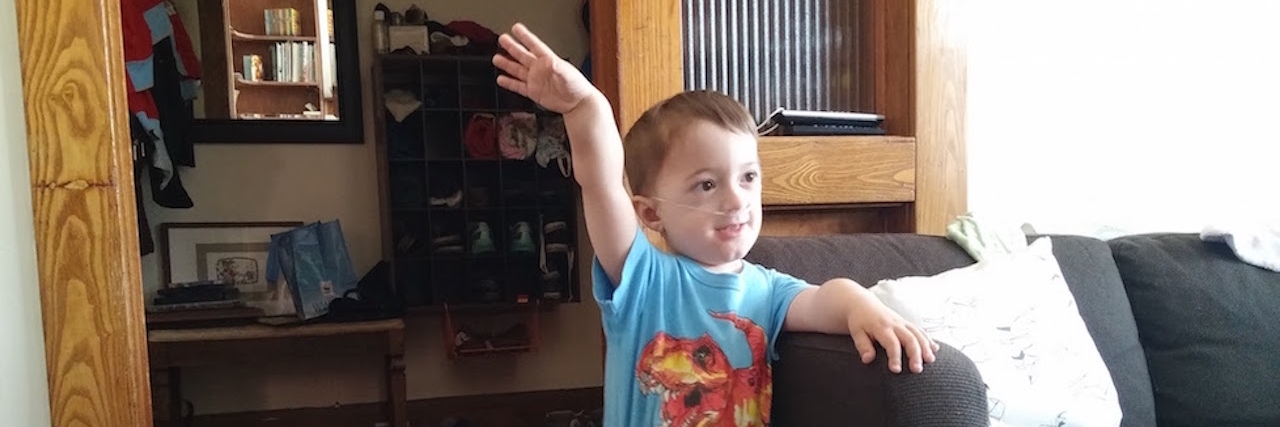Why I Don’t Have a Close Friend Who Is Also a Special Needs Parent
The dad swoops in, whisking his son away from the playground. “We’d better get going!”
Moments earlier, my then 2-year-old son, Branko, had mustered up a weak “hello” for the boy after sticking his tongue out for a solid 30 seconds. It was his typical greeting at the time. Branko’s voice is still weak from the surgery, the one that left him with two bright blue, full-leg casts. The swooping and whisking seems to be a typical finale for most playground encounters these days. I’m reluctant to admit it, but I know it was those casts. It’s always the damn casts. These situations don’t seem to bother Branko, but I feel a mild sting every time.
“Pretty sure casts aren’t contagious!”
I would never actually say this.
Even though I’m secretly proud of my wit, I dutifully curb all sarcastic impulses. I bite my tongue and subdue my face into a hideous but moderately believable fake smile. My motivation for being polite stems from one goal: to make new friends.
I’m going to put most of the blame for my friend famine on Branko, now a gangly, cast-free 4-year-old. Born with a rare genetic condition, a collage of health problems and a handful of lengthy hospital stays, Branko has no difficulty engaging with his peers and vice versa. Most of the other children we meet don’t seem to notice all his extra stuff — the casts, oxygen tanks, ankle-foot orthotics and the walker. In fact, most children beg for a turn in that walker, too.
Don’t get the wrong idea. I have my friends — the ones who drop everything to bring chocolate and beer the moment they hear Branko is sick. Even though I’m grateful for this support, something still doesn’t quite feel right. I haven’t yet made a close friend who is also a parent of a child with special needs.
To make our situation even more unique, my husband and I are the only two people on the planet with a kid exactly like Branko. His particular genetic mutation is a brand new, one-of-a-kind thing. There are no statistics for him and no clear trajectory for his health. There’s not even a name yet for what he has. I can only describe symptoms: weak bones, lung disease, skeletal deformities. I often wish I could mumble the name of a condition and just be on my merry way.
Despite not being able to Google his diagnosis, I cautiously and appropriately try to make connections online, venturing into the territories of all things rare and genetic. Fully aware that I will never actually belong to these groups, I still manage to educate myself on anything and everything relating to Branko’s condition: osteogenesis imperfecta, spina bifida and chondroplasia, to name a few. I reach out with words of support, desperately trying to convince these parents of the common elements between us. I rarely get a response.
One of the first changes we noticed in Branko’s bones was a slight bowing in his legs. The misalignment worsened as he grew, causing the tibia to shift and pop through his skin. Prior to this, many parents of typical children commented on the bowing, without truly understanding the significance of their appearance.
“My son’s legs did the same thing, and look at him now! He’s fine.”
It was as if we were discussing sunburn. I couldn’t listen to their remarks because our kids simply weren’t the same, genetically speaking. They weren’t part of my club, just like I’m not currently in the autism or Down syndrome club. In a perfect world, I would have found my people. I don’t even know if my people exist or will ever exist.
In a perfect world, I could sift through stories of others with the same mutation and try to find something hopeful to latch onto. In a perfect world, I would discover a healthy 35-year-old who overcame several bouts of pneumonia and a handful of surgeries. But these stories haven’t been written. My son is the only one going through this.
We haven’t yet been welcomed into the online world of special needs parenting, and in real life, the playground parents can’t handle seeing a sweet little boy wearing two bright-blue casts. I get it. We are the cautionary tale. We are the ones people feel sorry for. It’s a hard role to accept, but I’m almost there.
Perhaps, and this is the most reasonable assumption, I’m still wearing the fear of the unknown, or more specifically, the fear of outliving him. Maybe this look lingers too long on my face, in my wrinkles, on my permanently chapped lips, creating the appearance of a person who would rather be left alone. In other words, maybe it’s just me. And while this appearance might say (or scream) back off, this gnawing voice inside me wants you to know that something as simple as meeting my eyes would silence that voice. A quick hello, a high-five, an email or an acknowledgement that I exist would silence that voice.
Until I find my people, please play nice. My son might not officially belong in your world. But you are welcome in ours any time.
Follow this journey on Branko Has Funny Bones.
The Mighty is asking the following: What’s one thing people might not know about your experience with disability and/or disease, and what would you say to teach them? If you’d like to participate, please send a blog post to community@themighty.com. Please include a photo for the piece, a photo of yourself and 1-2 sentence bio. Check out our Share Your Story page for more about our submission guidelines.


